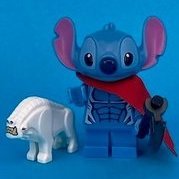[Freebuild] Notomys: Fish tales...
The build: Anton's Bait Shop
The story:
Anton was something of a fixture in the sleepy hamlet of Notomys. The burly and gregarious fisherman was always ready with a tall tale or a free filet for a family in need. While his Bait Shop sold supplies – hooks and bait, smoked fish and seafood – many villagers stopped by more for entertainment. There was that story of Anton riding a manta ray right up the estuary; his claim to have caught a gorgeous naiad with his lucky lure (actually a rather furious were-beaver); or the yarn about how he drunk some visiting dwarves under the table – and what a low table it was!
When the Drow incursions into Avalonia reached the Enchanted Forest, Anton was one of many local men lining up for the Notomys’ militia. It was a mixed-race contingent, reflecting the diverse population of the village and its surrounds: men and wood elves, jerboans and were-beasts, even the odd local orc. Unsurprisingly, the militia operated in a somewhat chaotic fashion but it did enough to harass and harry the Drow and buy enough time for support to arrive from a unit of fleet-footed elven stag cavalry.
Sadly, while Anton returned from the war, he did not survive it.
Shot in the leg by a poisoned Drow arrow, Anton was carried home by one of his fellow militia, a weathered grent known as Rimurapa. The unlikely pair had bonded when Anton shared a few, stumbling words of greeting in the old Druidic tongue with the tree-man. The fisherman had learned the phrase from his wife, a wood carver and devotee of the old ways, until she passed on after the birth of their second child, Gorki.
Anton spent his final week with his children, Sofia and Gorki, retelling familiar stories. Most stories ended with a rip-snorting punchline, but they also contained wisdom and nuggets of fishing knowledge – where the fattest trout liked to sun themselves on winter days or the best bait for catching the rare, blue woolly eel. In truth, he needn’t have worried: although still a young woman, Sofia was a natural at crafting traps and snares that even the wariest crustaceans were draw to. Gorki was still merely a boy, but Anton knew the village would help raise him into a man.
Still, fathers were fathers. Anton’s final words were directed not at his children but at Rimu:
“Promise me, you’ll watch over my kin. Promise!”
Rimu promised.
Grent ways were mysterious, even to those that had lived among the forest folk for centuries. Anton couldn’t have known he would be taken literally by the grent with Rimu sinking his roots deep into the soft silty soil behind the fishing shack, going to seed.
Years passed from that sad day and still Rimu stood tall, watching over the grave of the father and his dear children. Seasonally, the grent’s limbs bore juicy purple plums while edible mushrooms sprouted from his trunk. Between this and Sofia’s seafood catch, the orphaned siblings not only survived but were able to set aside a little coin. Sofia bought chickens – the lucky birds were allowed to shelter inside the shack when storms struck – grew a veggie patch with some gifts from the market gardener and even mended the leaky roof.
The Notomys villagers did their part, too, by continuing to support Anton’s Bait Shop. Now, though, the roles were reversed: it was the villagers sharing their favourite story of the gregarious fisherman or supplying a free meal to a family in need.
Build notes:
C&C welcome and appreciated.
